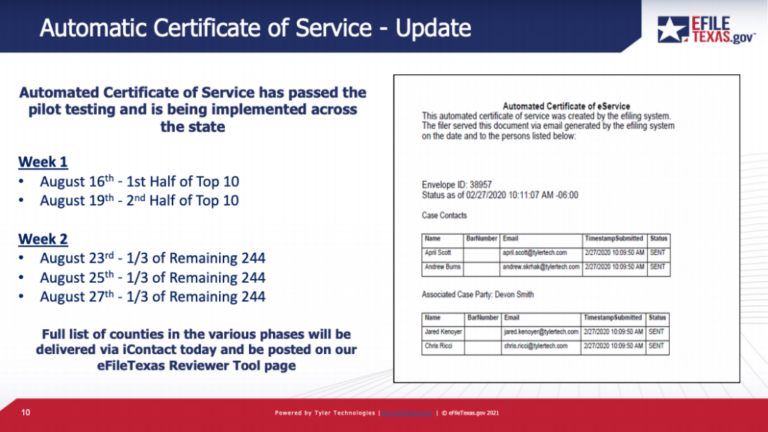About a year ago, I released a video entitled “Automated Certificates of Service Are Coming.” The wait is over. As of this week, automated certificates of service will be rolled out in every Texas court set up for e-filing.
What is an automated certificate of service?
Texas Rule of Civil Procedure 21a(e) and Texas Rule of Appellate Procedure 9.5(d)-(e) require proof of service when a document is filed with the court. Traditional certificates of service provide that proof by having the filing party’s attorney attest that the document has been served on the other parties to the case.
A few years ago, the Judicial Committee on Information Technology (of which I’m a member) approved the development of an automated certificate of service, the idea being that it would serve the same function as a traditional certificate and eventually eliminate the need for lawyers to include traditional certificates within e-filed documents. As developed, the automated certificate is appended to the lead document, lists the case parties and contacts, and shows their service status as of the time the certificate is created.
The automated certificate went through extensive beta testing, beginning with the Texas Supreme Court and continuing with several intermediate appellate courts and trial courts. It is stable and has functioned as intended. The Supreme Court, the Office of Court Administration, and JCIT have approved its widespread rollout.
What are the upsides?
The primary benefits of automated certificates of service are efficiency and accuracy. The parties and the court can instantly tell who received the document through the e-filing system. Future improvements will include a hyperlink that shows the online report with the status of delivery and the day and time each recipient opened the document. This will cut down on disputes about whether a lawyer served the document on a specific party and whether that party received or read it. Eventually, the automated certificate will replace the traditional certificate entirely.
In fairness, some have complained that the automated certificates have increased the time necessary to process new filings and the storage space necessary to save documents. Although these concerns don’t appear to be common, the e-filing vendor (Tyler Technologies) has promised to review them and make any appropriate tweaks.
Do I still have to include a certificate of service when e-filing a document?
Yes, to comply with TRCP 21a(e) or TRAP 9.5(d)-(e) . . . but keep reading.
What would happen if I left a certificate of service out of my document?
That would likely depend on the court in which the document is being filed.
Some courts that beta-tested the automated certificate are accepting filings that omit a traditional certificate of service. In those courts, the automated certificate has effected a de facto rule change.
Other courts—especially those new to the automated certificate—may approach the issue differently. This group could reject filings omitting a traditional certificate complying with TRCP 21a(e) or TRAP 9.5(e).
Is a formal rule change on the horizon?
Yes, but the timing is uncertain.
In August 2020, the Supreme Court Advisory Committee’s Appellate Rules Subcommittee recommended amending TRAP 9.5(d) and (e) to eliminate the certificate-of-service requirement for e-filed documents. The proposed amendment, which has been presented to the Texas Supreme Court, reads:

Thus far, the Supreme Court has taken no action on the recommendation.
One possible reason for the delay is the Supreme Court’s preference to handle rule changes in larger packages. Proposed rule changes require publication in the Texas Bar Journal, followed by a comment period before the Court issues an order approving the amendment. Recent changes to the discovery rules illustrate this process.
SCOTX should amend the service rules promptly.
By mandating e-filing, the Supreme Court demonstrated a commitment to efficiency in both the practice of law and the administration of justice. On average, nearly 40,000 filings go through the e-filing system each day. On the whole, the system has been an incredible success.
With automated certificates of service rolling out statewide, confusion about whether traditional certificates of service are still required is sure to follow. The Court could alleviate this confusion and avoid the resulting inefficiencies by initiating the formal amendment process for TRAP 9.5 (and TRCP 21a) as soon as possible.
